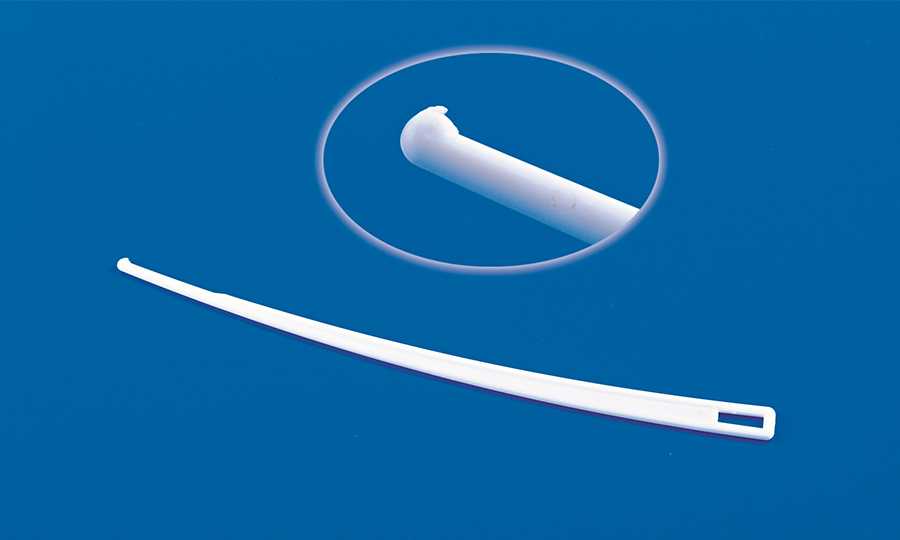The amniotic fluid hook plays a vital role in obstetrics by assisting healthcare professionals in conducting various prenatal diagnostics. In this article, we delve into the significance of the amniotic fluid hook in collecting amniotic fluid, enabling the detection of fetal abnormalities and ensuring the well-being of both the mother and baby during pregnancy. Gain a better understanding of how this tool aids in obstetric examinations and the importance of amniotic fluid sampling for prenatal diagnostics. Stay informed about the role of the amniotic fluid hook in supporting maternal health and promoting healthy fetal development.


Disposable sterile Amniotic Fluid Hook
l Sterilized by EO gas. Non-toxic. Non-pyrogenic, single use only
l Sterile Amniotic Membrane Perforator made from medical grade plastic material
l It is mainly used for woman delivery babies
l Material: Medical Grade ABS
l Individual Packing: PE or Blister

Obstetrics is a specialized branch of medicine that focuses on the healthcare of pregnant women, ensuring the well-being of both the mother and the developing fetus. Within this field, the amniotic fluid hook plays a critical role in facilitating various prenatal diagnostics and ensuring comprehensive maternal and fetal care.
The amniotic fluid hook, also known as an amniohook or amnihook, is a medical tool specifically designed for the purpose of collecting amniotic fluid during pregnancy. Amniotic fluid sampling is a procedure often performed during the second or third trimester of pregnancy to assess the health and well-being of the fetus.
Amniotic fluid is the fluid that surrounds the fetus in the uterus. It contains cells shed by the baby, as well as other substances that provide valuable information about the baby's development and overall health. By collecting a sample of this fluid using the amniotic fluid hook, healthcare professionals can perform various tests and diagnostics to detect potential fetal abnormalities and assess the baby's overall well-being.
One of the primary uses of amniotic fluid sampling is to detect chromosomal abnormalities, such as Down syndrome or genetic disorders that can impact the baby's health. The amniotic fluid hook allows for the safe collection of the amniotic fluid, which is then sent to a laboratory for analysis. Through advanced genetic testing, healthcare providers can identify any genetic anomalies and provide parents with important information to make informed decisions about their pregnancy and the future well-being of their child.
Amniotic fluid sampling can also be used to assess the baby's lung maturity in cases where an early delivery is anticipated. By analyzing certain substances present in the amniotic fluid, healthcare professionals can determine if the baby's lungs are ready for independent breathing outside the womb. This information is crucial in ensuring the safe delivery and postnatal care of the newborn.
It's important to note that the procedure of amniotic fluid sampling is performed under strict medical supervision and only when deemed necessary. The amniotic fluid hook is a specialized tool specifically designed to safely collect the fluid without causing harm to the mother or the baby.
In conclusion, the amniotic fluid hook plays a significant role in obstetrics by enabling the safe and accurate collection of amniotic fluid for various prenatal diagnostics. Through amniotic fluid sampling, healthcare professionals can detect potential fetal abnormalities, assess lung maturity, and provide valuable information to parents. This tool enhances the level of care and ensures the well-being of both the mother and the developing fetus during the crucial period of pregnancy. Stay informed about the importance of amniotic fluid sampling and its role in supporting maternal health and promoting healthy fetal development.
Note: Medical procedures and tests, including amniotic fluid sampling, should always be performed under the guidance of trained healthcare professionals. Consult your healthcare provider for any concerns or questions related to prenatal diagnostics and maternal health.


Contact: Neo
Phone: 008615867460640
E-mail: Info@Hwtai.com
Whatsapp:008615867460640
Add: Building 2, Xinmao Qilu Science Technology Industrial Park, Tianqiao District, Jinan City, Shandong Province,China.
We chat
